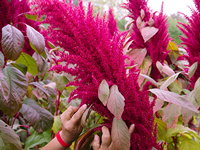
SDH Captioned
Grades 7-12, College, Adults
Directed by Sue Williams
Produced by Sue Williams
DVD Purchase $350, Rent $95
US Release Date: 2024
Copyright Date: 2024
DVD ISBN: 1-961192-19-5
Subjects
Agriculture
Animals
Climate Change/Global Warming
Environment
Food And Nutrition
Food Studies
Indigenous Peoples
Native Americans
Science
Technology
Society
Sustainability
Sustainable Agriculture
Fixing Food 2
Looks at changes being made to the ways we produce and consume our food: inventing an entirely new way of producing food, learning from Indigenous food sources, and reimagining agriculture.
 |
"[H]opeful stories of people...creating healthy, delicious food that honors the environment, prioritizes social justice, and promotes community health." Amy Bentley, Prof, Nutrition & Food Studies, NYU |
To many of us, climate change is remote, abstract, too grim to consider, too far removed from our daily lives. But we now know that one of the biggest triggers for global warming is something all of us do every day: eating.
Growing and processing food, and packaging and bringing it to us - all use enormous amounts of energy, water, and chemicals, creating an overwhelming burden on our planet's resources. Fortunately, across the country, intrepid innovators are recognizing and exploring solutions to the problems of growing our nation's food while responding to climate change.
Their stories challenge us all: If we change the way we eat, can we save our planet?
The four short films are available on one DVD. Individual episodes are available on Docuseek. The episodes are:
Food from the Air 9:35 mins Lisa Dyson is the founder and CEO of Air Protein, a company driven by ambitions almost as vast as space itself. As the 4th African American woman ever to earn a doctorate in physics, Lisa is well-equipped to take on its extraordinary mission: to create food from pure elements of the air.
Healing the Land 8:39 mins Follows six months of animal life on Wild Harmony Farm, a 40-acre organic livestock spread run by Rachael Slattery and her husband Ben. As they describe their situation, young farmers today are inheriting tired land, land that has been overused and abused for generations - and their job is to restore it. Where conventional industrial agriculture runs on pesticides, herbicides and animals raised in warehouses, the couple practices regenerative farming, prioritizing soil health, biodiversity, and healthy livestock raised outdoors.
Native Roots 8:05 mins This inspiring video tells the remarkable story of Shyla Sheppard, the first Native American woman to own a brewery. Set against the backdrop of a white male-dominated industry and pervasive racism, her journey is one of resilience, determination, and cultural pride.
Seeds of Resilience 9:08 mins Together, Sarah Montgomery and indigenous Mayan activists work to reclaim an important cultural heritage: amaranth, the tall, leafy grain long derided in the United States as "pigweed," that may just offer a sustainable grain alternative to the pressing climate challenges on our monolithic, industrialized food systems.
Reviews
"We need more opportunities for creative ways to fix our food system and it is imperative that we look beyond a financial bottom line to have solutions that are ecologically sustainable, good for public health, and socially just. Fixing Food 2 provides creative insights into solutions that help people in all communities have nourishing, enjoyable food and beverages. This film lifts up people from BIPOC communities that are working towards more regenerative ways to produce our food. Bravo."
"These four short films give fascinating glimpses of alternative ways to produce food (and beer) more sustainably. The vignettes are appropriate for high school or an introductory course on food systems at the college level and will appeal to a range of different students. They are especially good at showing the importance of maintaining culture through foodways despite historical oppression or 'forgetting' good practices from the past."
"Fixing Food II spans the spectrum of alternatives, from replacing nature to returning to nature, in meeting the global food challenges of the future. The four-part documentary also includes stories that blend wisdom from the past with knowledge focused on the future. This film should be an instant starter for class, organization, and community group discussions of how best to ensure enough food for the future."
"With a deep respect for people and their relationship with other people and place, Fixing Food 2 documents some of the multiple pathways to reimagine our food system with ideas both old and new."
"While we all need to understand the urgency of climate change and declining planetary health, the unending litany of grim news can be discouraging, and disempowering. This film is the opposite, showcasing the tremendous potential for human ingenuity to address this crisis by reimagining food production. Fixing Food 2 is an inspiring tale of modern wonder, the power of scientific creativity, and above all - hope!"
"Fixing Food 2 brings four snapshots of food systems projects that are regionally diverse. The film tells stories of cultural revival and amaranth, micro-brewing and Indigenous knowledge, meat made from the air (and a few other ingredients), and humane livestock. Each vignette presents just one perspective on the topic, inviting viewers to engage with follow-up research of their own. Sure to spark curiosity, this film is worth it for the beautiful images of amaranth alone."
"Fixing Food 2 provides hopeful stories of people attempting to produce food differently -- creating healthy, delicious food that honors the environment, prioritizes social justice, and promotes community health. Useful for classrooms and audiences of any age."